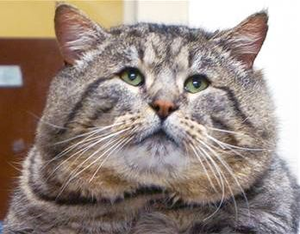Animal Behavior
Fat Cat Fiasco
Owner of morbidly obese cat is charged with animal abuse
Posted February 14, 2014

Is it a form of abuse if you allow your animal to become morbidly obese? According to a judge in Ottowa, the answer is yes. A woman has been charged with permitting distress and failing to provide adequate care to her cat Napoleon, who was brought to the Ottowa Humane Society unable even to stand up or groom himself because he was so fat. Napoleon weighed in at 25 pounds, and was so morbidly obese that the shelter staff judged euthanasia to be in his best interests. Napoleon’s owner couldn’t claim ignorance because she had been counseled to keep his weight down but hadn’t listened to the vet’s advice. As a result of her conviction, she will have to pay a restitution fine to the Ottowa Humane Society and will not be allowed to own an animal for the next five years.
I think the response of officials to this case is entirely appropriate and should be a reminder to all people who have a companion animal in their care: allowing an animal to become overweight is a form of neglect or, if it really gets out of hand like it did for Napoleon, a form of outright abuse. Of course there are shades of gray. There is a big difference between Napoleon’s situation and the cat who is a pound or two over his ideal weight. And as a huge number of people with animals know, maintaining an ideal weight is a constant struggle and some animals, like some people, have more trouble than others and are prone to weight gain. My dog Bella is a good example: she gets a ton of exercise and I am really careful with how much I feed, but she still carries a pound or two more than she should—and my vet makes us do a weigh in every time she sees Bella.
Food is an expression of love and care, but an overabundance of food-love can become downright unkind.


